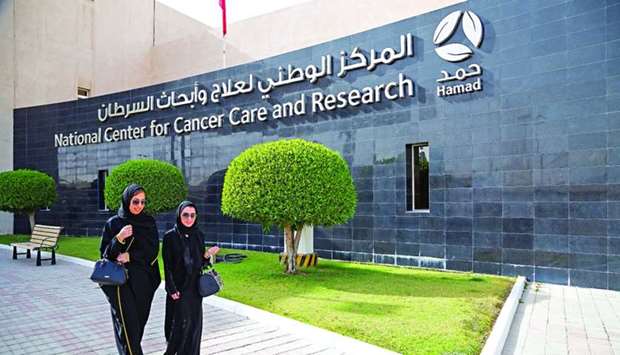In recognition of liver cancer awareness month in Qatar, Hamad Medical Corporation (HMC) is educating the public about liver cancer prevention, the importance of early detection and treatment options.
According to the latest World Health Organisation data, there were 53 deaths in Qatar as a result of liver cancer in 2017, HMC said in a statement Monday.
Liver cancer begins in the cells of the liver and can be secondary to hepatitis B and C infections. It is the fifth most common type of cancer among men and the second most common cause of cancer deaths worldwide, accounting for more than 600,000 deaths each year.
Most liver cancers can be prevented by vaccinating against the hepatitis B virus and getting treatment for hepatitis C. While hepatitis B and hepatitis C infections are major risk factors for liver cancer, excessive alcohol intake, tobacco use, Type 2 diabetes, and anabolic steroid use, as well as an unhealthy diet accompanied by a sedentary lifestyle, are strong contributory factors for the disease.
Dr Kakil Abdul Rasul, senior consultant oncology, National Center for Cancer Care and Research, said while the early diagnosis of liver cancer can be challenging as many of the signs and symptoms do not appear until it is in its later stages, identifying the disease early allows for more treatment options.

“Individuals at a high risk of developing liver cancer should have regular medical checkups, as liver cancer is much more difficult to treat if it is not diagnosed early. Surgery is usually recommended if the cancer is small, hasn’t spread to other organs, and if the patient is in good overall health. Medical cancer therapy uses oral or intravenous drugs that target cancerous cells. Other treatments such as cryotherapy, radiofrequency ablation, and radiotherapy are also available and used in select cases,” explained Dr Rasul.
Symptoms of liver cancer include unexplained weight loss and loss of appetite, fatigue, an enlarged liver (felt as a mass under the ribs on the right side), an enlarged spleen (felt as a mass under the ribs on the left side), feeling very full after a small meal, yellowing of the skin and eyes (jaundice), swelling or fluid build-up in the abdomen, nausea and vomiting, and abdominal pain near the right shoulder blade.
Ultrasound, a blood test to check for increased levels of alpha-fetoprotein, computed tomography scan and magnetic resonance imaging (MRI) are among the most effective methods to diagnose liver cancer.
“The prognosis for those diagnosed with liver cancer is not always positive, but treatment can delay the natural progression of this cancer. Research on new drugs is currently ongoing and will hopefully help to improve the prognosis for liver cancer patients,” added Dr Rasul.
“By utilising the highest quality medical equipment and treatment administered under the care of highly trained and experienced staff, and by working together in collaboration with our healthcare partners, we can help reduce the number of new cases and reverse trends in liver cancer-related mortality. Ultimately this will help ensure that far fewer people die from this disease,” concluded Dr Rasul.
Liver cancer begins in the cells of the liver and can be secondary to hepatitis B and C infections. It is the fifth most common type of cancer among men and the second most common cause of cancer deaths worldwide, accounting for more than 600,000 deaths each year.
Most liver cancers can be prevented by vaccinating against the hepatitis B virus and getting treatment for hepatitis C. While hepatitis B and hepatitis C infections are major risk factors for liver cancer, excessive alcohol intake, tobacco use, Type 2 diabetes, and anabolic steroid use, as well as an unhealthy diet accompanied by a sedentary lifestyle, are strong contributory factors for the disease.
Dr Kakil Abdul Rasul, senior consultant oncology, National Center for Cancer Care and Research, said while the early diagnosis of liver cancer can be challenging as many of the signs and symptoms do not appear until it is in its later stages, identifying the disease early allows for more treatment options.

Dr Kakil Abdul Rasul
“Individuals at a high risk of developing liver cancer should have regular medical checkups, as liver cancer is much more difficult to treat if it is not diagnosed early. Surgery is usually recommended if the cancer is small, hasn’t spread to other organs, and if the patient is in good overall health. Medical cancer therapy uses oral or intravenous drugs that target cancerous cells. Other treatments such as cryotherapy, radiofrequency ablation, and radiotherapy are also available and used in select cases,” explained Dr Rasul.
Symptoms of liver cancer include unexplained weight loss and loss of appetite, fatigue, an enlarged liver (felt as a mass under the ribs on the right side), an enlarged spleen (felt as a mass under the ribs on the left side), feeling very full after a small meal, yellowing of the skin and eyes (jaundice), swelling or fluid build-up in the abdomen, nausea and vomiting, and abdominal pain near the right shoulder blade.
Ultrasound, a blood test to check for increased levels of alpha-fetoprotein, computed tomography scan and magnetic resonance imaging (MRI) are among the most effective methods to diagnose liver cancer.
“The prognosis for those diagnosed with liver cancer is not always positive, but treatment can delay the natural progression of this cancer. Research on new drugs is currently ongoing and will hopefully help to improve the prognosis for liver cancer patients,” added Dr Rasul.
“By utilising the highest quality medical equipment and treatment administered under the care of highly trained and experienced staff, and by working together in collaboration with our healthcare partners, we can help reduce the number of new cases and reverse trends in liver cancer-related mortality. Ultimately this will help ensure that far fewer people die from this disease,” concluded Dr Rasul.

